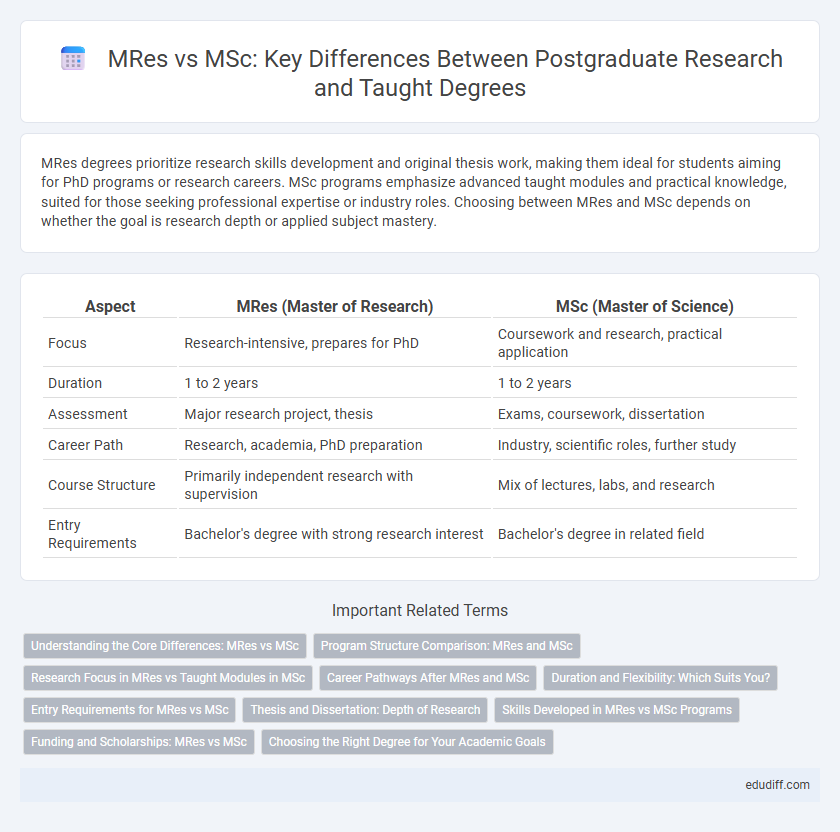MRes degrees prioritize research skills development and original thesis work, making them ideal for students aiming for PhD programs or research careers. MSc programs emphasize advanced taught modules and practical knowledge, suited for those seeking professional expertise or industry roles. Choosing between MRes and MSc depends on whether the goal is research depth or applied subject mastery.
Table of Comparison
| Aspect | MRes (Master of Research) | MSc (Master of Science) |
|---|---|---|
| Focus | Research-intensive, prepares for PhD | Coursework and research, practical application |
| Duration | 1 to 2 years | 1 to 2 years |
| Assessment | Major research project, thesis | Exams, coursework, dissertation |
| Career Path | Research, academia, PhD preparation | Industry, scientific roles, further study |
| Course Structure | Primarily independent research with supervision | Mix of lectures, labs, and research |
| Entry Requirements | Bachelor's degree with strong research interest | Bachelor's degree in related field |
Understanding the Core Differences: MRes vs MSc
The MRes (Master of Research) emphasizes independent research skills and prepares students for doctoral study by focusing on a substantial research project, while the MSc (Master of Science) combines taught coursework with independent research, offering a more structured curriculum. MRes programs typically require a longer dissertation and less coursework, providing deeper specialization in research methodology. MSc degrees often cater to students seeking professional practice or applied knowledge in scientific or technical fields, balancing theoretical study and practical application.
Program Structure Comparison: MRes and MSc
The MRes program emphasizes independent research with a significant thesis component, typically accounting for 70-80% of the course, designed to prepare students for doctoral studies. In contrast, the MSc program balances taught modules and research, with coursework making up about 60-70%, focused on advanced theoretical and practical knowledge in a specific discipline. While MRes offers a flexible, research-intensive pathway, MSc programs provide structured learning with assessed assignments and final projects.
Research Focus in MRes vs Taught Modules in MSc
The MRes prioritizes in-depth research training, allowing students to develop advanced skills through extensive independent projects and supervised thesis work. In contrast, the MSc centers on taught modules that provide broad theoretical knowledge and practical skills across various subjects within the discipline. This distinction makes the MRes ideal for students aiming to pursue doctoral studies or research careers, while the MSc suits those seeking professional development or applied expertise.
Career Pathways After MRes and MSc
MRes programs emphasize research skills and typically lead to careers in academia, research institutions, or PhD studies, providing strong foundations for scientific and analytical roles. MSc degrees often focus on practical knowledge and industry applications, preparing graduates for professional roles in sectors such as finance, engineering, healthcare, and technology. Employers value MRes graduates for their advanced research capabilities, while MSc holders are sought after for their technical expertise and applied skills.
Duration and Flexibility: Which Suits You?
MRes programs typically last one year and emphasize research with greater flexibility in thesis topics compared to MSc degrees, which usually last one to two years and combine coursework with a smaller research component. MSc degrees offer structured learning with set modules, making them ideal for students seeking a balance between practical knowledge and theory. Consider your career goals and preferred learning style when choosing between the flexible, research-intensive MRes and the more comprehensive, taught MSc pathways.
Entry Requirements for MRes vs MSc
MRes programs often require candidates with a strong research background or relevant experience, emphasizing a higher academic standard or prior research degrees. MSc courses typically accept students with a bachelor's degree in a related field, focusing more on coursework and practical skills than extensive research. Entry requirements for MRes are generally more stringent, prioritizing academic excellence and research potential compared to MSc programs.
Thesis and Dissertation: Depth of Research
An MRes (Master of Research) emphasizes a substantial thesis that requires original research contributing new knowledge or insights within a specific field, often spanning 60,000 to 70,000 words. In contrast, an MSc (Master of Science) typically includes a shorter dissertation, around 15,000 to 25,000 words, combined with taught coursework, focusing more on applying existing knowledge than conducting original research. The MRes is ideal for students aiming to pursue doctoral studies or research-intensive careers, while the MSc suits those seeking advanced professional or technical skills.
Skills Developed in MRes vs MSc Programs
MRes programs emphasize advanced research skills, critical analysis, and independent project management, preparing students for doctoral studies or research-intensive careers. MSc programs focus more on developing specialized knowledge and practical abilities in a specific discipline, often with coursework and applied projects. Both degrees cultivate analytical and problem-solving skills, but MRes prioritizes research methodology while MSc leans toward professional expertise.
Funding and Scholarships: MRes vs MSc
Funding opportunities for MRes programs often emphasize research grants and scholarships targeted at thesis-based projects, while MSc programs typically offer a wider range of scholarships including merit-based, need-based, and industry-sponsored awards. MRes students may benefit from funding that supports intensive, specialized research training, whereas MSc candidates frequently access financial aid designed for taught coursework and professional development. Understanding the distinct funding structures can help postgraduate applicants optimize scholarship applications based on program focus and available resources.
Choosing the Right Degree for Your Academic Goals
An MRes degree emphasizes research skills and independent project work, making it ideal for students aiming to pursue a PhD or a research-oriented career. An MSc program offers a broader curriculum with a mix of coursework and practical applications, suited for those seeking professional development or careers in industry. Understanding your long-term academic and career objectives is essential when deciding between an MRes's research focus and an MSc's comprehensive academic training.
MRes vs MSc Infographic

 edudiff.com
edudiff.com